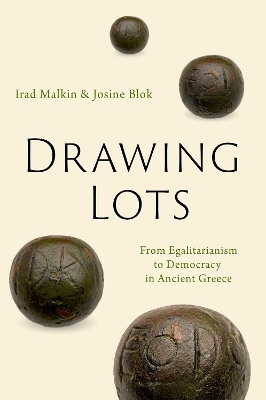
Drawing Lots
Oxford University Press Inc (Verlag)
978-0-19-775347-7 (ISBN)
The authors explore the egalitarian, "horizonal," mindset expressed in using the lot instead of a top-down vision of authority and sovereignty. Drawing lots presupposed equality among participants deserving equal "portions" and was used for distributing land, inheritance, booty, sacrificial meat, selecting individuals, setting turns, mixing and reorganizing groups, and divining the will of the gods. Lot-oracles were used for divination; otherwise, the gods guarded the justice of the procedure but only rarely determined the outcome. It was a self-evident method broadly and ubiquitously applied. Drawing lots would crystallize community boundaries and emphasize its sovereignty. The book further investigates the transposition of the drawing of lots to the governance of the polis. The implied egalitarianism of the lot often conflicted with top-down perceptions of society and the values of inequality, status, and merit. Drawing lots was introduced into oligarchies and democracies at an uneven pace and scale. Its wide use in the democracy of classical Athens was an exceptional case, eye-catching both in antiquity and today.
The book concludes with a discussion about the meaning of the Greek examples for drawing lots today and the increasing interest in using random selection in politics as a possibility for modern democracies around the world. The appendix surveys the Greek vocabulary of lottery practices.
Irad Malkin is Emeritus Professor of History at Tel Aviv University, a Foreign Member of the Athens National Academy, a member of the European Network for the Study of Ancient Greek History, and the author of numerous books, including A Small Greek World. Josine Blok is Professor Emeritus of Ancient History and Classical Civilization at Utrecht University, a member of the Royal Dutch Academy of Sciences, and co-founder and chair of the European Network for the Study of Ancient Greek History. Her previous books include Citizenship in Classical Athens.
List of abbreviations
Preface
Introduction Greeks drawing lots: the practice and the mindset of egalitarianism
Part I The lottery mindset: religion and society
1. Lotteries divine and human: the world of the Homeric epics
2. When does the lot reflect the will of the gods? Lots, oracles, divination, and the notion of moira
3. Sacrifice and feast: social values and the distribution of meat by lot
Part II Equal and fair: inheritance, colonization, and mixture
4. Partible Inheritance by lot
5. Drawing lots on the Athenian stage
6. Founding cities and sharing in the polis: equality, allotment, and civic mixture
Part III Drawing lots in polis governance
7. Setting the stage
8. Drawing lots for polis office
9. Drawing lots for governance: a political innovation
Part IV Conclusions
10. Conclusions and implications
11. Drawing lots today: fair distribution and a stronger democracy
Appendix A Lexicographical survey: lottery practices in the archaic and classical periods
Bibliography
Index
Index locorum
| Erscheinungsdatum | 09.05.2024 |
|---|---|
| Zusatzinfo | 14 line drawings, 9 photographs, 3 maps |
| Verlagsort | New York |
| Sprache | englisch |
| Maße | 145 x 226 mm |
| Gewicht | 907 g |
| Themenwelt | Geschichte ► Allgemeine Geschichte ► Vor- und Frühgeschichte |
| Geschichte ► Allgemeine Geschichte ► Altertum / Antike | |
| Geisteswissenschaften ► Religion / Theologie ► Weitere Religionen | |
| Recht / Steuern ► Allgemeines / Lexika | |
| Recht / Steuern ► Rechtsgeschichte | |
| ISBN-10 | 0-19-775347-7 / 0197753477 |
| ISBN-13 | 978-0-19-775347-7 / 9780197753477 |
| Zustand | Neuware |
| Haben Sie eine Frage zum Produkt? |
aus dem Bereich


